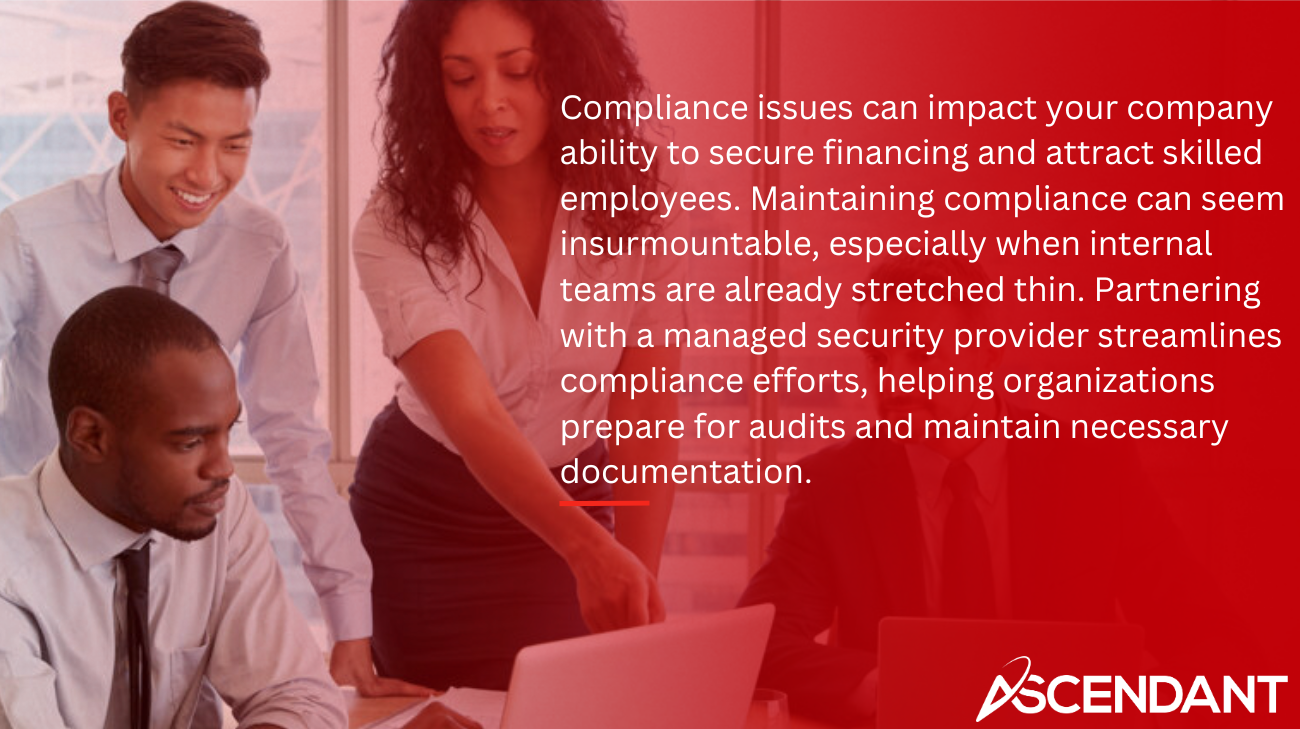Is your IT team drowning in cyber threats? Are compliance requirements getting too much to handle? These are signs your business needs a managed security provider. Here are the top signs it’s time to get professional security services to keep your business safe and running smoothly.
In This Article:
- Your IT Team is Overloaded with Cyber Threats
- Compliance and Regulatory Requirements Are Overwhelming
- Your Security Posture Lacks Real-Time Visibility
- Incident Response is Slow and Inefficient
- Skill Gaps in Your Internal Team
- You’re Experiencing Frequent Downtime Due to Security Issues
- Your Business Grows but Your Security Measures Don’t Scale
- Outdated Systems and Software Updates are Neglected
- Vulnerability Management is Lacking
- You’re Concerned About Long-Term Improvements
Key Takeaways
- If your internal IT team is overwhelmed, a Managed Security Provider can take on the heavy lifting, allowing your team to focus on strategic initiatives.
- Alert fatigue and firefighting modes indicate your security measures need upgrading; managed security services can streamline alerts and improve overall efficiency.
- As your business grows, compliance and vulnerability management become more complex, making it essential to partner with a managed security provider for scalable and proactive solutions.
Your IT Team is Overloaded with Cyber Threats
Many organizations find that their internal IT teams cannot keep up with the pace of evolving cyber threats. The sheer volume and complexity of these threats can overwhelm even the most dedicated teams. Managed security service providers (MSSPs) offer 24/7 coverage and specialized expertise that many companies struggle to maintain in-house. This constant vigilance ensures threats are detected and mitigated before causing significant damage.
Outsourcing security operations alleviates the workload on internal teams, enabling them to focus on strategic activities rather than constant firefighting. A long-term relationship with an MSSP can transform cybersecurity from a reactive burden into a proactive strategy supporting business growth. This shift enhances security and empowers your IT team to contribute more effectively to your organization’s overall objectives.
Alert Fatigue is Draining Your Resources
Does the endless stream of security alerts sound familiar? This is a classic case of alert fatigue, where continuous alerts overwhelm your IT team, resulting in missed threats and decreased efficiency. It’s a sign that your business needs to rethink its approach to cybersecurity. Alert fatigue negatively impacts internal teams’ ability to respond effectively to security threats. When resources are stretched thin, critical alerts can easily get lost in the noise, leaving your organization vulnerable.
Managed security providers can streamline alerts, reducing the noise and enabling internal teams to concentrate on critical security strategies. Reducing alert fatigue allows internal teams to focus on strategic initiatives instead of emergency responses. This not only improves your security posture but also enhances overall productivity and morale within your IT department.
Firefighting Mode is the Norm
When firefighting mode becomes the norm, it indicates your internal teams are stretched too thin dealing with constant cyber threats. This reactive approach can lead to frequent downtime, data loss, and inefficiencies. Partnering with a managed security provider fills expertise gaps in handling advanced security solutions.
Managed security providers minimize downtime through proactive monitoring and quick resolution of security incidents, conducting regular vulnerability assessments to identify and mitigate risks before they become serious threats, and ensuring systems are up-to-date and secure, minimizing downtime. This proactive approach alleviates constant firefighting and supports long-term strategic initiatives for sustainable security improvements in the environment efficiently.
Compliance and Regulatory Requirements Are Overwhelming
Navigating compliance standards and regulations can be overwhelming for any business. As your organization grows, compliance-related risks increase, creating additional pressure on your resources. The demand for managed security services is rising due to a shortage of qualified cybersecurity experts and budget limitations. Failing to adhere to compliance requirements can lead to severe penalties, including loss of business standing and financial liabilities.

Compliance issues can impact your company ability to secure financing and attract skilled employees. Maintaining compliance can seem insurmountable, especially when internal teams are already stretched thin. Partnering with a managed security provider streamlines compliance efforts, helping organizations prepare for audits and maintain necessary documentation.
Staying current with software updates and conducting regular vulnerability assessments, managed security providers ensure compliance with evolving security standards, reducing exposure to potential attacks. This proactive approach helps meet compliance requirements and strengthens your overall security posture.
Your Security Posture Lacks Real-Time Visibility
Without real-time visibility, your business is vulnerable to undetected threats amid increasing cyber attacks. Managed security providers offer several advantages by implementing 24/7 surveillance to detect and address security threats promptly, enabling timely interventions. They use advanced analytics and machine learning to enhance threat detection and allow identification of potential breaches before they occur.
Top managed cybersecurity providers use proactive threat hunting methods to minimize the need for reactive responses from IT teams. Integrating sophisticated security tools, managed service providers enable businesses to bolster their defenses against evolving cyber threats.
Real-time dashboards, regular reports, and insights keep you informed about your security posture and signs. This vigilance allows your organization to focus on primary business functions, relieving the burden of ongoing security management tasks to monitor.
Incident Response is Slow and Inefficient
Rapid incident response is crucial to minimize the impact of security breaches. Slow response times can lead to prolonged downtime and significant financial losses. Managed security providers ensure swift incident response through advanced tools and automated capabilities, allowing quick identification and containment of threats.
Managed Security Operations Centers use these advanced tools for effective incident management, ensuring critical incidents are prioritized for immediate response. This approach minimizes downtime and mitigates the impact of security incidents on your business operations.
Skill Gaps in Your Internal Team
Uncertainty in answering questions indicates a knowledge gap in your internal team. Human error, a common cause of many cybersecurity incidents, highlights skill gaps in handling security measures. Managed security providers supplement your existing team with the expertise needed to enhance your security posture.
Managed security service providers offer 24/7 monitoring, threat detection, incident response, and specialized security tools and expertise. This expert support offers peace of mind to organizations, especially those in the cybersecurity industry that cannot afford a full-time cybersecurity partner team.
Managed security service providers free up your internal IT team to focus on critical cybersecurity tasks, improving overall efficiency and security.
You’re Experiencing Frequent Downtime Due to Security Issues
Frequent outages severely impact operations and reputation. Managed security providers minimize downtime through proactive monitoring and regular maintenance. A good managed service provider integrates cybersecurity as a core function rather than a secondary service. This integration ensures your business is protected from cyber threats, minimizing the risk of downtime caused by security breaches.
By addressing security concerns and providing endpoint protection, managed security providers ensure your IT infrastructure remains robust and resilient against attacks. This proactive approach supports business continuity and enhances overall productivity and operational efficiency.
Your Business Grows but Your Security Measures Don’t Scale
As your business grows, security concerns also increase. Medium sized businesses often turn to managed security providers to manage increasing cyber risks effectively. Adapting to new users, devices, and infrastructure requires scalable solutions. Limited security resources often hinder implementing scalable cybersecurity solutions alongside business expansion.
Managed security services help organizations swiftly adapt their security frameworks to accommodate an expanding number of users and devices. Providers of managed security solutions offer flexible service models, enabling businesses to adjust their security needs based on growth and changing operational demands. This flexibility ensures your security measures can scale with your business, maintaining strong protective measures without overburdening your internal teams.
Employing a virtual Chief Information Security Officer (vCISO) helps organizations develop and implement scalable security frameworks to support their growth. This strategic role ensures your cybersecurity strategies adjust and evolve in response to emerging threats and compliance demands, supporting your long-term business goals.
Outdated Systems and Software Updates Are Neglected
Neglecting software updates and security patches leads to reduced productivity and frequent crashes. Failure to apply updates results in significant operational disruptions, including system crashes and degraded performance. Managed security providers ensure all systems are up-to-date and secure by conducting regular security testing and continuous monitoring.
By keeping your IT infrastructure current, managed security providers help prevent configuration errors and ensure your systems are equipped with the latest security tools and functionalities. This proactive maintenance enhances user productivity and strengthens your organization’s overall security posture.
Vulnerability Management is Lacking
Implementing a structured vulnerability management process enables organizations to proactively identify and mitigate risks, reducing their overall exposure to cyber threats. Effective vulnerability management involves a continuous cycle of discovering vulnerabilities, prioritizing them, taking action, and reassessing to ensure risks are mitigated.
Automation in vulnerability management streamlines processes, reducing the time and resources needed to identify and address security weaknesses. Managed service providers offer comprehensive vulnerability management solutions, helping organizations maintain a strong security posture and protect against emerging threats.
You’re Concerned About Long-Term Improvements
Long-term cybersecurity strategies are essential to adapt to the evolving threat landscape and enhance organizational resilience. Managed Security Service Providers (MSSPs) offer tailored security architectures that fit seamlessly into existing infrastructures, ensuring continuous protection. Partnering with a leading provider allows organizations to focus on strategic initiatives that drive long-term improvements in their security posture, making them a strategic partner in their cybersecurity efforts.
Staying ahead of cyber threats requires continuous monitoring and proactive measures. Managed security providers help organizations stay ahead by offering advanced security solutions and expert support. This proactive approach enhances security and supports overall business productivity and reputation.
 Summary
Summary
In summary, the signs that your business needs a managed security provider are clear. From overwhelmed IT teams and compliance challenges to outdated systems and scalability issues, managed security providers offer the expertise and resources needed to address these critical areas. By partnering with a managed security provider, organizations can transform their cybersecurity strategy from reactive to proactive, ensuring long-term protection and business growth.
Remember, cybersecurity is not just a technical issue; it’s a strategic imperative. Investing in a managed security provider can provide peace of mind and allow your organization to focus on what it does best. Stay safe, stay secure, and consider the long-term benefits of managed security services for your organization.
Frequently Asked Questions
How can a managed security provider help with alert fatigue?
A managed security provider can help with alert fatigue by streamlining alerts and cutting down on unnecessary noise, allowing your team to concentrate on more strategic tasks instead of constantly reacting to emergencies. This helps create a more efficient and less stressful work environment.
What role does a vCISO play in scaling security measures?
A vCISO is crucial for scaling security measures as they create and implement flexible security frameworks that grow with your business and address new threats. This ensures your security strategy evolves alongside your organization.
How do managed security providers ensure compliance with regulatory requirements?
Managed security providers ensure compliance by preparing for audits, maintaining proper documentation, and keeping up-to-date with software updates and vulnerability assessments. This way, they make it easier for businesses to meet regulatory standards.
What are the benefits of real-time visibility in cybersecurity?
Real-time visibility in cybersecurity greatly improves your ability to detect and respond to threats quickly, which helps strengthen your overall security. It empowers you to be proactive in identifying risks before they escalate.
Why is long-term cybersecurity strategy important?
A long-term cybersecurity strategy is crucial because it helps organizations stay ahead of constantly evolving threats and boosts resilience through tailored security measures. By investing in a robust plan, you ensure your systems are continuously protected.

